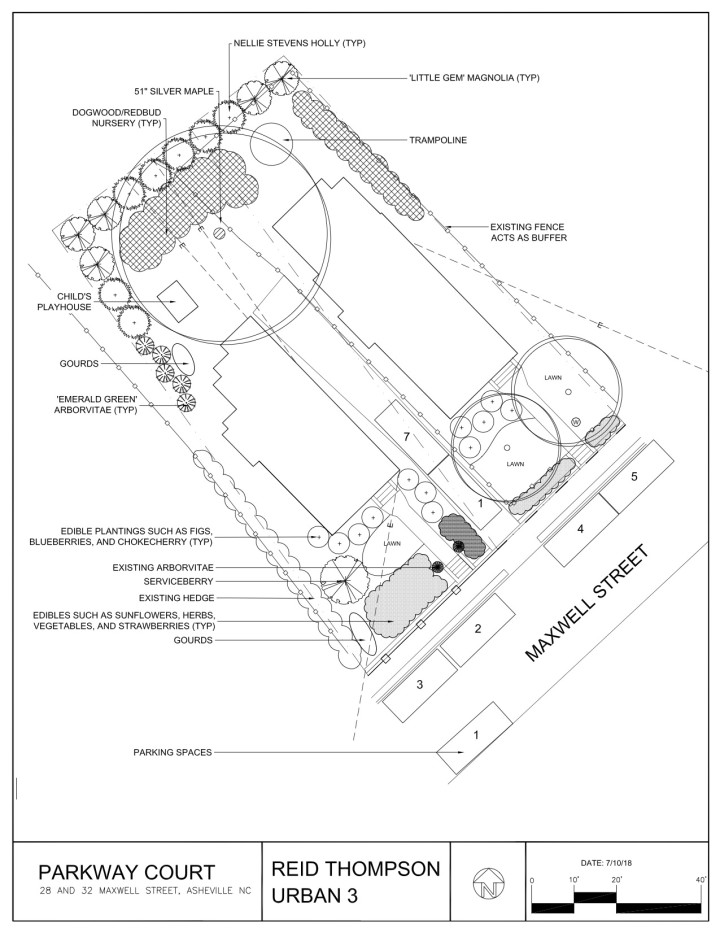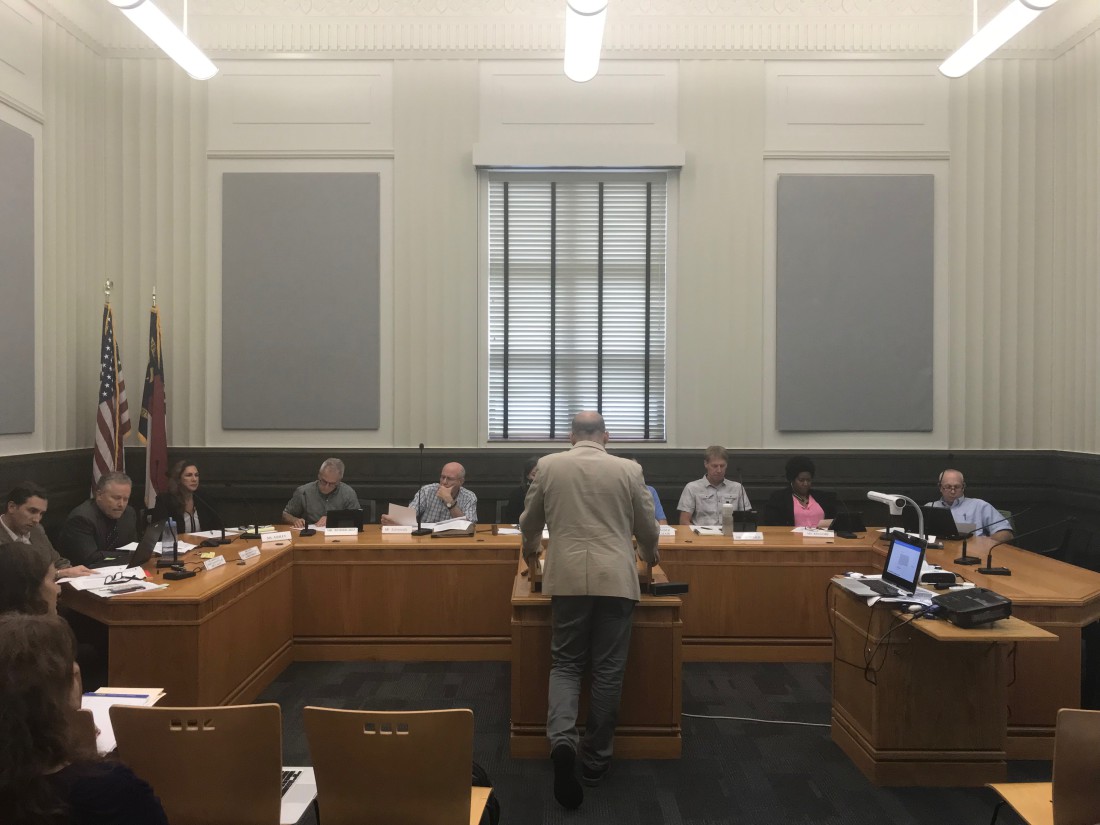Residents along Maxwell Street near downtown Asheville have a beef with one of their neighbors — Greenlife Grocery.
Long-standing tensions over truck traffic for store deliveries along the street were aired during a meeting of Asheville’s Planning and Zoning Commission on July 19 as part of a hearing on a request to rezone two houses on the street to allow for short-term rentals. Without special zoning approval, renting whole living units for periods of fewer than 30 days is not allowed in any part of the city.
Velvet Hawthorne, who has owned a house on Maxwell since 2010, said that large tractor-trailer trucks have difficulty navigating the residential street. She described a recent incident in which a large truck came close to scraping against her car and running over her garden before ultimately backing up along the road.
“This happens all the time,” she said.
Reid Thompson requested the rezoning for his properties at 28 and 32 Maxwell St., which are located across the street from Greenlife and its loading dock. Urban planner Joe Minicozzi is representing Thompson and spoke on behalf of his application at the commission meeting. Minicozzi argued that the city has been inconsistent in enforcing its own rules on the street, with Thompson receiving fines for operating short-term rentals while Greenlife’s violations of city traffic rules have gone unpunished.
For example, many of the delivery trucks that use the street, Minicozzi said, are far larger than allowed by city code, a violation he compared to greatly exceeding the speed limit. “Imagine being in a school zone where the speed limit is 25 miles per hour and somebody just whizzes by at 75 miles per hour,” he said.
Thompson said the city has mishandled issues along the street.
“We did 10 years, 15 years of the FedEx guy driving by my house beeping his horn, gunning up and down the street,” Thompson told members of the commission. “Where was city staff? Who protected us?”
The July 19 meeting marked the second time the commission considered the request, which was continued from the board’s May 2 meeting. City planning staff had recommended denying the application, arguing the proposed use of the property would be inconsistent with the surrounding zoning districts. Staff said the properties are too small to provide the buffering and parking required by code and pointed out that on-street parking on Maxwell is limited to long-term residents to reduce the impact of commercial users. Additionally, staff argued that the request would require amending part of the Living Asheville Comprehensive Plan, which was adopted while the rezoning request was being studied.
In the zoning application, Thompson proposed that all three apartment units at 28 Maxwell would be used as short-term rentals, while two of the three units at 32 Maxwell would be used as short-term rentals and one would be designated exclusively for long-term rental. The short-term rentals could be converted to long-term rentals. The application also included the addition of a 5-foot landscape buffer.

Members of the commission acknowledged that there is an issue along the corridor but pointed out that the question before them was whether to rezone the properties.
“As we make our decision this evening, unfortunately we won’t change the actual situation,” said commission Chair Laura Hudson. “I’m sorry for Maxwell Street, but we can’t improve the conditions.”
“I think the applicant has demonstrated that there is an intrusion of commercial activity on his property,” Hudson said. “There was no buffer put in place. We were remiss in not providing that from the beginning and perhaps could have avoided this entire situation.”
Hudson said she doesn’t like the idea of short-term rentals in residential neighborhoods but believes they can work in certain commercial areas.
“I’d like see Council wrestle with it and make that final determination,” Hudson said.
Commissioners voted 5-2 to recommend that City Council approve the zoning request.




So if Greenlife violates code, that means STR’s are allowed?
You mean if my house is located less than a block from Merrimon, it’s actually considered part of a commercial corridor?
No Lulz. See my comment down-thread. It was illegally “grandfathered”. The former A&P grocery had its delivery area at the Maxwell end of the building (which was the argument made by Greenlife and accepted by Oast and Shuford). But that loading dock had been out of use for many years when the building housed a laundry and a medical/nursing organization. (Forget the name just now …) So it could not be legally “grandfathered” per the UDO. Of course, it was cheaper for Greenlife, and who knows made money on that finesse of the rules? If that illegallity had been blocked, Greenlife’s loading and garbage area would have been established on the Merrimon end of the building and there wouldn’t have been any subsequent squabble.
But what if my house is located across a large parking lot where a dumpster is picked up? And what if that parking lot is full for a large part of the day. And people park there to use a business that isn’t part of the lot? And semi’s use it as a turn around?
Well, Staff argued the grandfathering even though the loading was constructed and added on to the building. Dr. Owens (from UNC-CH School of Gov’t) confirmed that it didn’t meet grandfathering for Council in 2006. Staff continued to not enforce the law, which destroyed the “residential” quality of the street to this day. There are tractor trailers that utilize Maxwell as an unbuffered loading area. Heck, they even wheel dumpster straight down the middle of the street. You cannot call it a “residential” street and then allow “commercial” use. Or worse, the City states that trucks shouldn’t be driving on Maxwell, but they don’t enforce the law (willingly) on that violation. It’s inconsistent application of the law. The Xpress covered this all with a strapping young reporter named Bothwell, back in the day, as well as this one: https://mountainx.com/news/community-news/010908maxwell/
Let’s cross Maxwell St. off the list for nice places to visit friends for dinner,
unless you like well fed entitled halfbacks or bros blasting Kid Rock
from a Honda with noisy twin tailpipes.
SRTs creeping like a poisonous viper?
Find out who owns them. Boycott them.
Post negative Yelp reviews online.
Take back your peace and quiet.
This helps to remediate a problem that can be laid squarely at the feet of former City Attorney Bob Oast and former City Planning Director Scott Shuford. I covered this extensively as a reporter for MountainX more than a dozen years ago. The rules at the time were clear: commercial property with frontage on a main road could not use a residential street for commercial purposes. But Shuford and Oast permitted Greenlife to orient their trash collection and delivery toward Maxwell instead of Merrimon. Oast even cooked up a novel definition, not contained in the Unified Development Ordinance (the governing law) – that Maxwell was a “mixed use” street. Complete fabrication.
Due to those decisions (supported by a pro-development majority on Council at the time, including at least one member who arguably had a financial interest in the property), Maxwell became a de facto commercial street. Had the law been fairly applied there would absolutely be no dumpsters or delivery on the Maxwell end of the parking lot, and arguably no driveway access at all – with a required plant buffer at the Maxwell interface.
Bad law enforcement and bad planning decisions created an extremely bad situation for Maxwell residential owners.
Reid Thomson has been right all along. Hopefully Council will endorse this decision.
This is today: https://www.youtube.com/watch?v=5aIIAKKMpIo&feature=em-share_video_user
UDO Sec. 10-84. – Noise producing activities; frequent sources of complaint; noise sensitive areas.
In addition to the general prohibition set forth above, the following activities are recognized as tending to produce unreasonably loud and raucous noises and as tending to constitute noise disturbances when conducted or permitted in an unreasonable manner. No person shall engage in any of the enumerated activities so as to cause a noise disturbance on neighboring premises:
(14) The operation of machinery in connection with loading or unloading any vehicles or the opening and destruction of bales, boxes, crates, and containers.
Council was aware in 2005 as well:
https://www.youtube.com/watch?v=SIRIxIlDa78&feature=youtu.be
I watched Joe Minicozzi’s presentation at the P&Z meeting and have read about the issues with Greenlife since the issues for the neighborhood began. Mr. Thompson owned a number of rental houses on the street and they were all long-term rentals. Once Greenlife opened, the quality of life for Maxwell Street residents, particularly those in Mr. Thompson’s homes directly across from the loading area, worsened considerably. One of the people who spoke at P&Z was a former tenant, who moved because she couldn’t take the noise and traffic issues created by the commercial use. Mr. Minicozzi’s presentation highlighted letters from other former residents who moved out of Mr. Thompson’s properties for the same reasons. Affordability is a major issue for much of our community, but our less affluent neighbors should be entitled to livability as well. Mr. Thompson is not kicking out long-term residents; he is trying to make lemonade. Short-term residents are willing to put up with noise and inconvenience – they’re not here to sit on the porch and relax with neighbors, they’re out and about and just need a place to sleep and make coffee. And I think it speaks volumes that every homeowner on the street has signed on in support of Mr. Thompson’s request for this zoning.
Reid Thompson’s biggest crime has been that he wouldn’t give up and go away. For about 15 years, he has been fighting for his rights and his neighborhood. He has been harassed and demonized and he has been forced to sell properties to fight his case. City staff made a mistake in allowing the commercial use in the first place and Council has been complicit in allowing it to continue. If the City is not going to require Greenlife to put it’s loading on the other side of the store as should have been done in the first place, restore the parking along Maxwell Street for neighborhood use and plant a buffer in place of the current loading area, then allowing the short term rentals in those two properties is the very least they can do. From P&Z chair Laura Hudson, “I think the applicant has demonstrated that there is an intrusion of commercial activity on his property. There was no buffer put in place.” From this story, “Staff said the properties are too small to provide the buffering and parking required by code.” I guess these properties were also considered to be too small to be entitled to equity. P&Z voted for fairness, now it’s up to Council.